RAPID CITY — Oglala Lakota creek patrol stalwart Hermus Bettelyoun leaned on his shovel as his breath formed clouds in the cold. “We are not protesters or activists,” he told reporter Chynna Lockett. “We are here for our people. We set up camp over here for their safety. At the same time, we’re going to have an ongoing creek patrol.”
Bettelyoun was one of six #Landback activists who were arrested after setting up a tipi tent camp for area homeless on treaty land along Rapid Creek. Bettelyoun and others see treaty land as part and parcel of the homelessness challenge.
“I’ve been arrested for standing up for my people and I’ll do it again. If it takes me to sit in a white man’s jail, that’s what I’ll do. If you do something with a good heart, everything’s going to work out.”
The legacy of Lakota Territory treaty violation came back to haunt city officials in the freezing wake of South Dakota’s 2020 Native American Day, as #Landback activists defied city ordinance by setting up the tipi encampment to shelter homeless people on Oct 16.
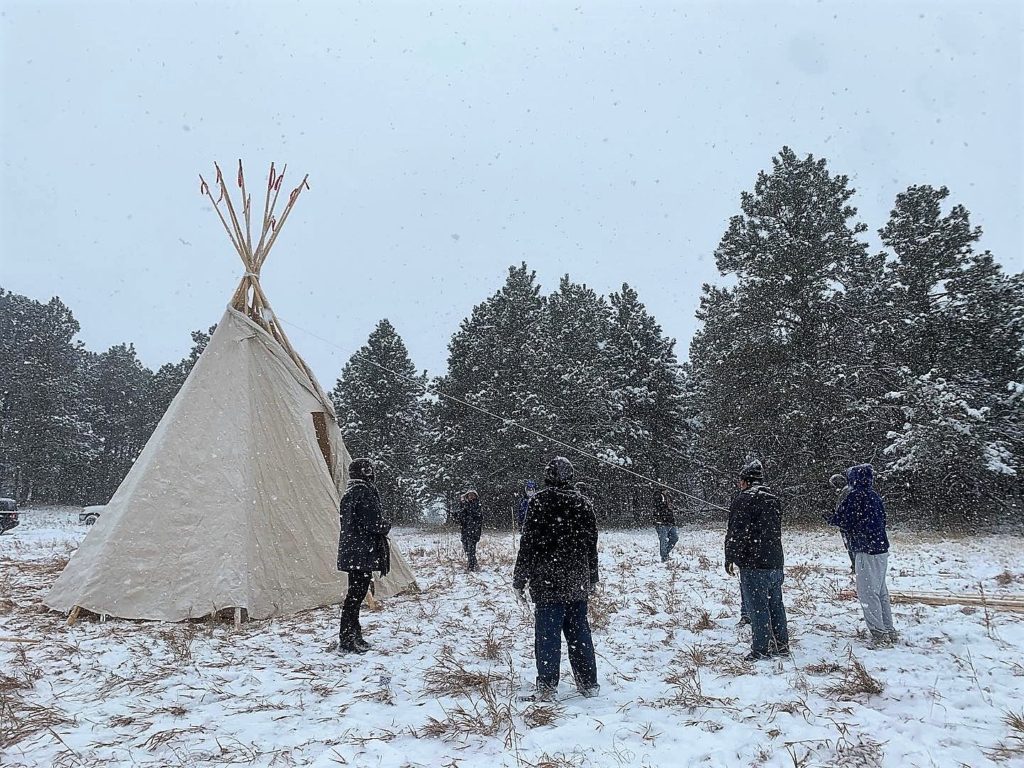
COURTESY / Camp Mni Luzahan
Camp Mni Luzahan, fostered by, among others, the Rapid City-based national non-profit NDN Collective, which launched the #Landback movement in July, sent out a release, stating:
“The settler state of South Dakota, the settlement of Rapid City, and the Rapid City Police Department create the conditions that make it so that our relatives are unsheltered and kept from basic living necessities. It is our right and our duty to care for our kin.”
Before the end of the day, participants were forced to dismantle the camp at the orders of city police, who arrived in some 20 patrol cars with red lights flashing, backed by the Pennington County Sheriff and the South Dakota Highway Patrol.
The police and mayor sustain that the Mni Luzahan Camp’s mobilization is a protest not related to homeless needs, but rather to #Landback pressure.
Six participants in the camp mobilization who refused to obey orders to abandon the premises were arrested, handcuffed, forced into a transport vehicle, booked, and released after nightfall.
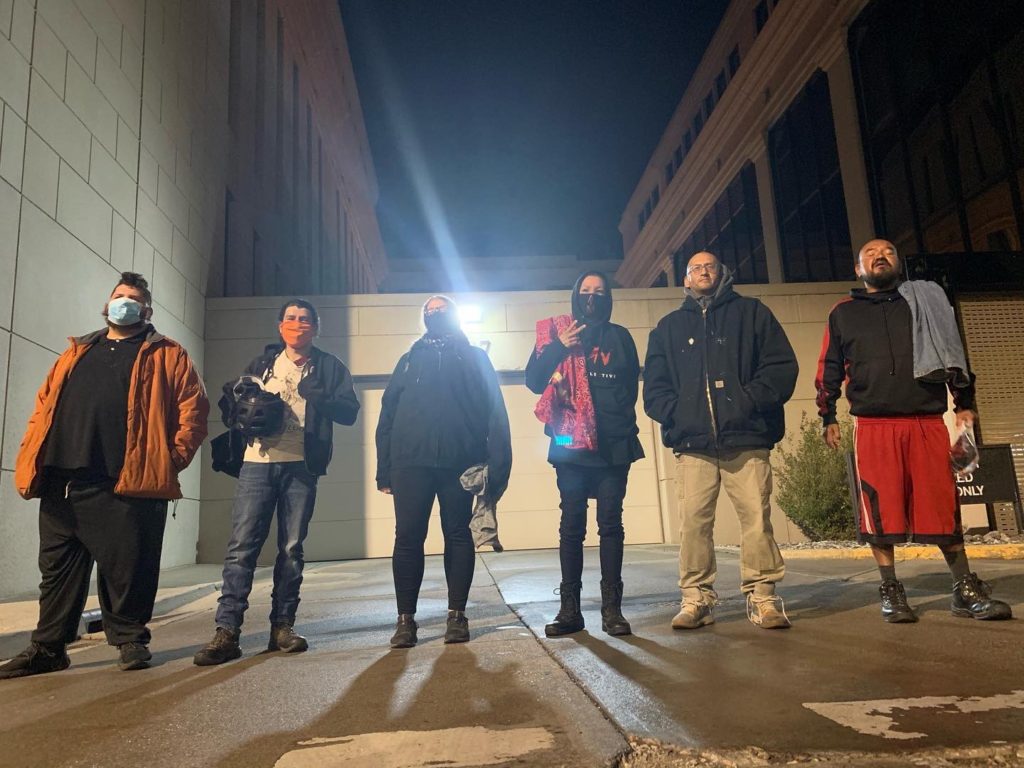
The tipi circle, named Camp Mni Luzahan by the independent homeless watchdog Mni Luzahan Creek Patrol that established it, takes the name from the Lakota words that translate to Rapid Creek.
The camp, consisting of four tipis and a chow line, as well as gear designed to provide warmth, light, and sanitation, popped up at a site over which the city claims jurisdiction on the banks of Rapid Creek adjacent to the fairgrounds.
The creek is a small rushing river that runs through Rapid City, serving historically as a Native camp and prayer destination while contemporarily having become a location at which displaced people lose their lives due to precarious circumstances.
A loose coalition of advocates for Constitutional treaty rights restoration and homeless protection asserts that if the 1868 Ft. Laramie Treaty were honored, homelessness would not exist in the Black Hills area.
Constituents maintain that since the treaty is broken, the city should bow to their demands for a native-run base to alleviate immediate needs of unhoused community members facing pandemic and cold season conditions, especially along the riverbanks.
The day after the tipi takedown, some news outlets received a media advisory that Mayor Steve Allender would hold a briefing to address the events surrounding it. Native Sun News Today, Rapid City’s only weekly and only Native newspaper, did not receive an invitation.
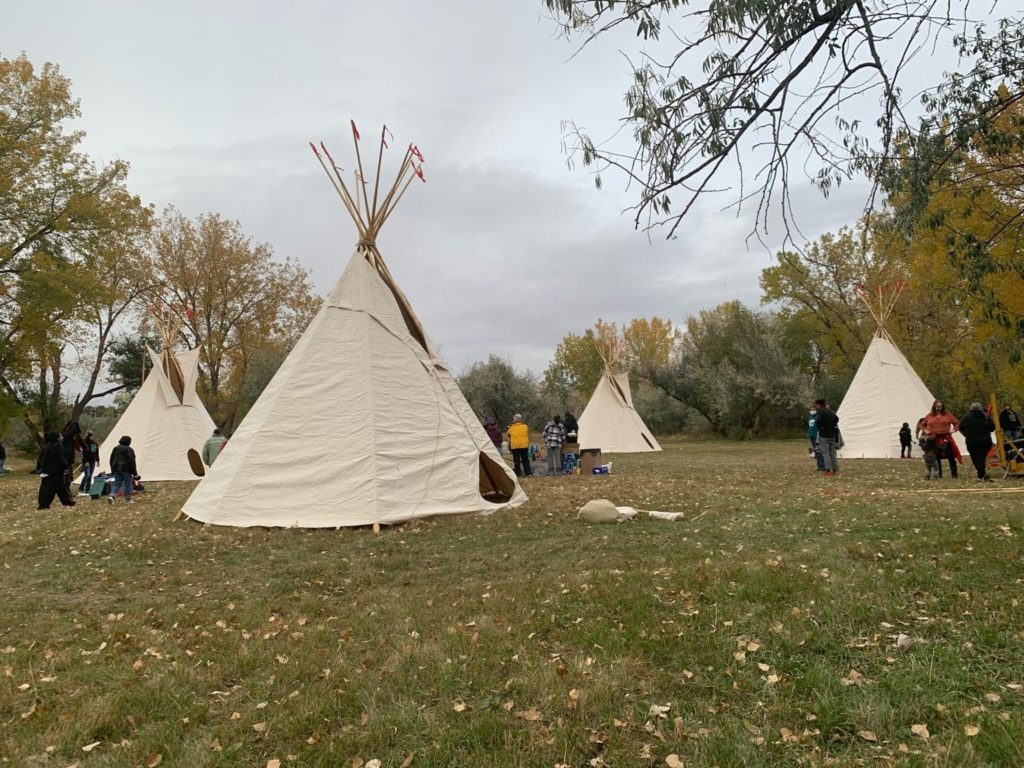
COURTESY / Camp Mni Luzahan
Freelance photojournalist Chynna Lockett, a member of the Independent Media Project who is a contributor to Native Sun News Today and The Esperanza Project, was personally refused entrance by the mayor, flanked by Police Chief Don Hedrick.
Lockett insisted: “I’m a journalist.” Allender retorted: “No you’re not. Step out, Chynna. You’re not coming in. You’re not invited. We’re not turning this into a circus.”
Mark K. Tilsen, an Oglala Lakota poet educator from the Pine Ridge Indian Reservation, was one of about a dozen people who also sought to attend the press conference, which was held at the mayor’s office. Allender, who is the former police chief, told him to quit holding the door open with his foot as Lockett argued she is a journalist.
He ordered Tilsen three times, “Shut the door,” then commanding, “Move your foot and shut the door; this public building is closed,” he pushed Tilsen back.
Allender’s action was greeted with shouts of, “That’s assault right there.” Supporting Tilsen, participants called on Hedrick to arrest Allender. One spoke up, saying, “If that was me that pushed him, I would be in handcuffs right now. You know it!”
Spouting expletives, they nonetheless dispersed after Hedrick said, “We’re not going to argue about this right now,” and “I don’t want to take anybody to jail today, okay?”
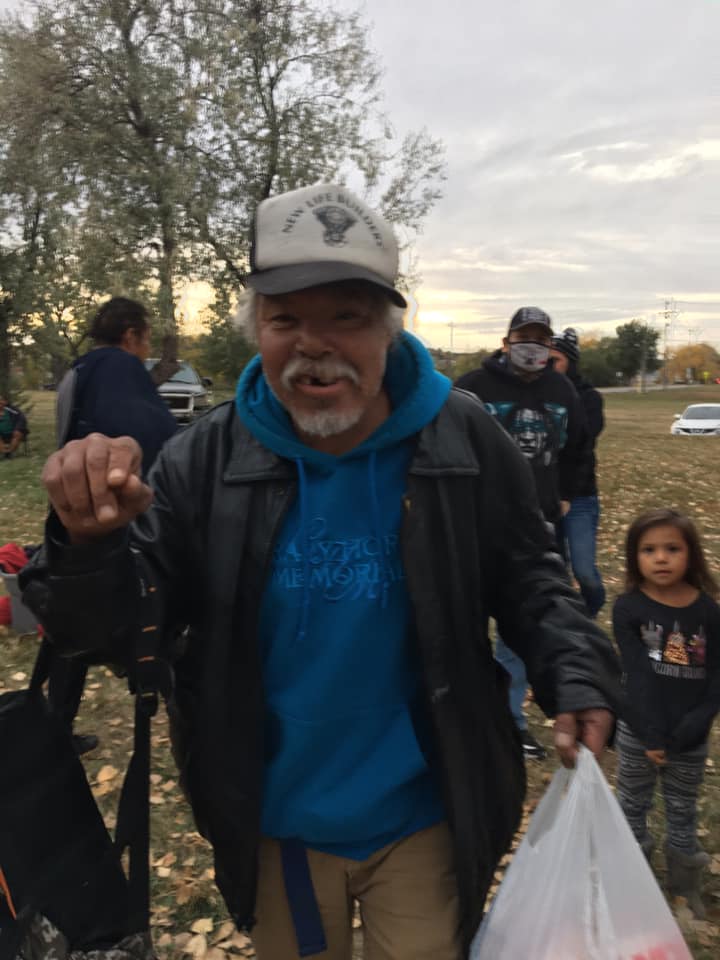
COURTESY / Jean Roach
Lockett and Tilsen are contemplating filing charges, and could be eligible for support from a new Mni Luzahan Legal Fund. Lockett was on the scene of the tipi takedown and documented Lakota grandmother Carrie MiddleTent’s detention, among other things, reporting:
“She was roughed up or aggressively handcuffed in the tipi…dragged to the unmarked police van…put face down on the ground in the freezing rain during her arrest. She is facing three charges — obstruction, resistance, and camping. The five others arrested are facing lesser charges, and no one else was charged with camping.”
MiddleTent reaffirmed the information in a media conference hosted by NDN Collective. She has been an integral part of the creek patrol and was a speaker at a Sept. 11 ominiciye (public gathering) here, calling on the mayor and city council to meet with grassroots leadership to set aside a “command center” where Native people can take charge of appropriate measures to support homeless relatives.
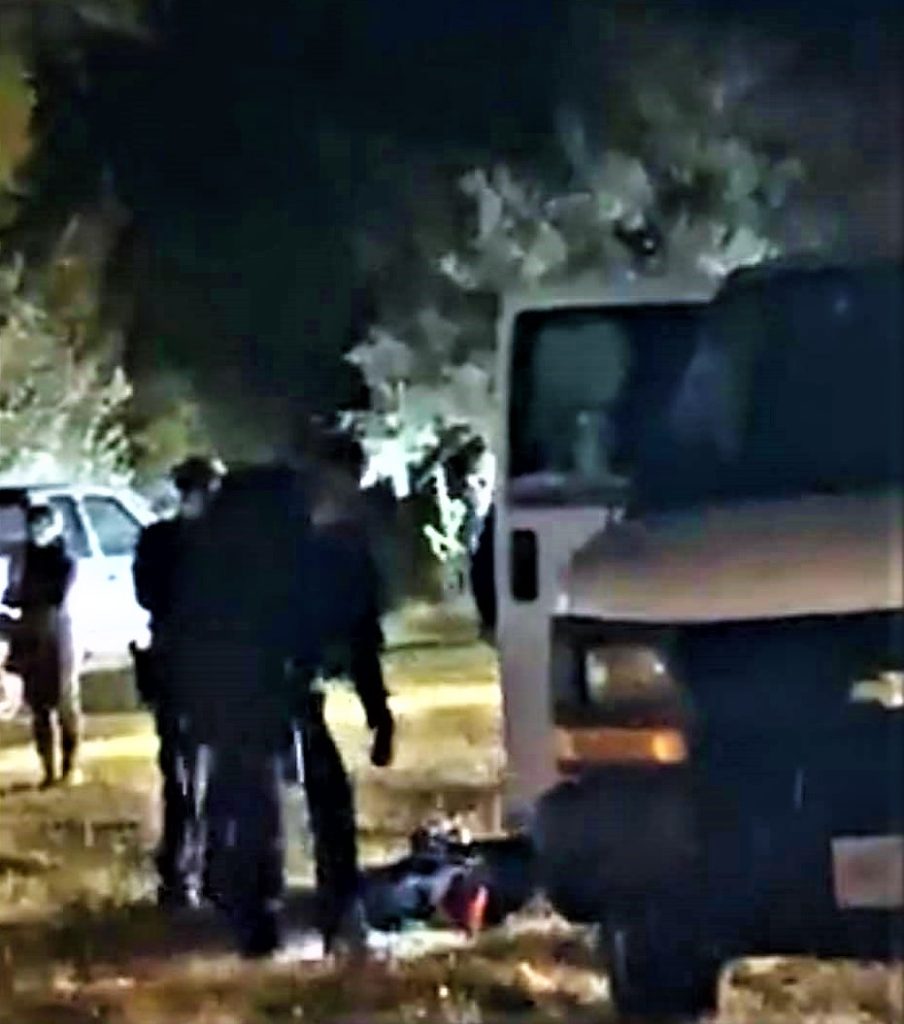
Grassroots coalition members also demand the city provide measures to stem long-term shortages of employment and affordable housing for all underserved community members.
They argue that half the city’s security budget goes to homeless issues but fails to be effective because it is not tailored to meet the needs.
The Rapid City Police Department earned a $750,000 grant from the Collective Healing Initiative of the International Association of Chiefs of Police to fund a Quality of Life Unit providing for “boots-on-the-ground social work services to homeless and vulnerable members of our community” in the Rapid Creek vicinity.
The unit, established in 2018, collaborates with Rapid City Collective Impact, Behavioral Management Systems, Center for American Indian Research & Native Studies, Working Against Violence Inc., and The Hope Center.
In accepting the award, Hedrick said the unit “believes that a measure of any community can be found in how it treats its most vulnerable members.”
However, at the exclusive media conference, Allender said he would not parley with the grassroots organizations that are caring for the homeless.
On Oct. 18, the day after the invitation-only conference, Camp Mni Luzahan went up anew, this time on land universally recognized as being under tribal jurisdiction in a rural area west of Rapid City.
Lloyd BigCrow Sr., leader of the OyateKin Chante Wastepi-Feeding our Relatives initiative, proclaimed, “The ancestors are with us,”
“I’m proud of the youth and elders here,” he declared as they set up the camp in the snow.
Some of the same advocates who had set up the initial camp, been forced to dismantle it, gotten arrested and gone to the mayor’s office were replanting the tipis, carrying firewood, and moving homeless from hotel rooms procured for the previous night.
The replacement camp is on land under the control of the Cheyenne River, Pine Ridge and Rosebud Sioux tribal governments, whose top elected leaders have given permission, Lockett confirmed.
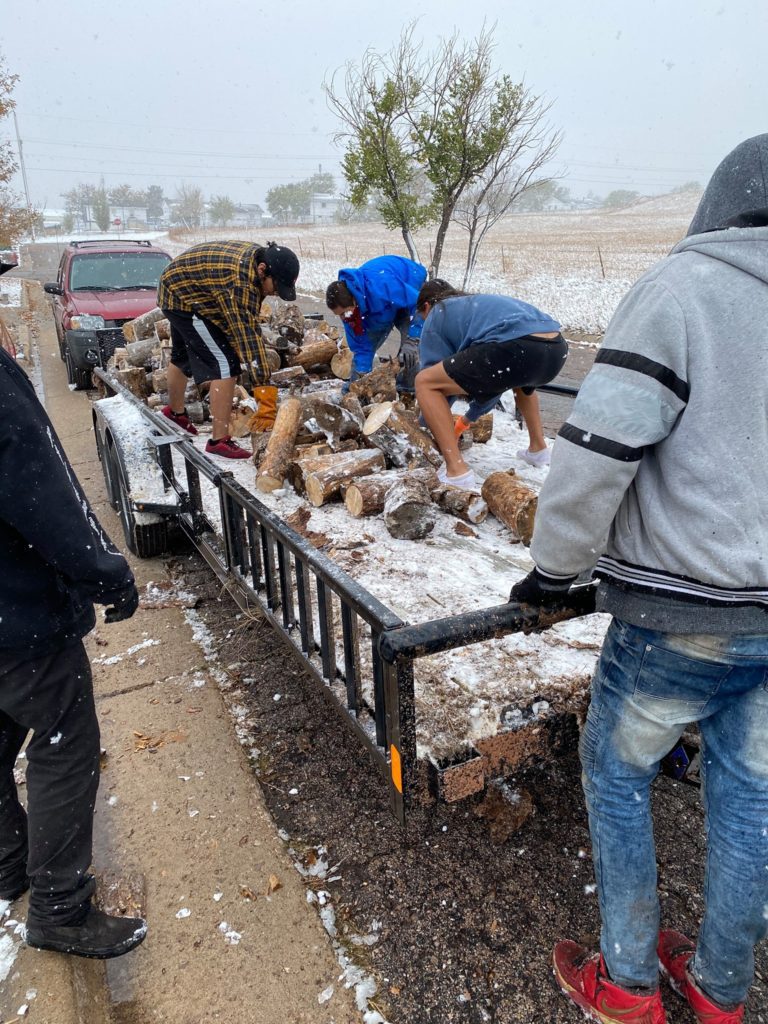
Sicangu Lakota grandmother Cheryl Angel, who is a spokesperson for pan-Indian unity, was among the first to tread on the grounds and exalt the new fire ignited at reborn Camp Mni Luzahan.
“Since time started, we’ve been lighting fires,” Angel told Lockett. “We start in ceremony and we stay in ceremony. All the knowledge we need to be sustainable is in it. We’re experiencing something our ancestors have been doing for tens of thousands of years.
“We’re in the sacred Black Hills. There were treaties signed on these lands and one of the things tribal people agreed to at that time was to maintain the peace. Maintaining the peace means making sure people’s healthcare, educational, physical, spiritual, and mental needs are met.
“The government has failed to maintain their responsibilities to the treaties. We are upholding our treaties. We’re going to maintain that peace and we’re going to take care of our people. Anyone who comes in, they are disturbing the peace.”
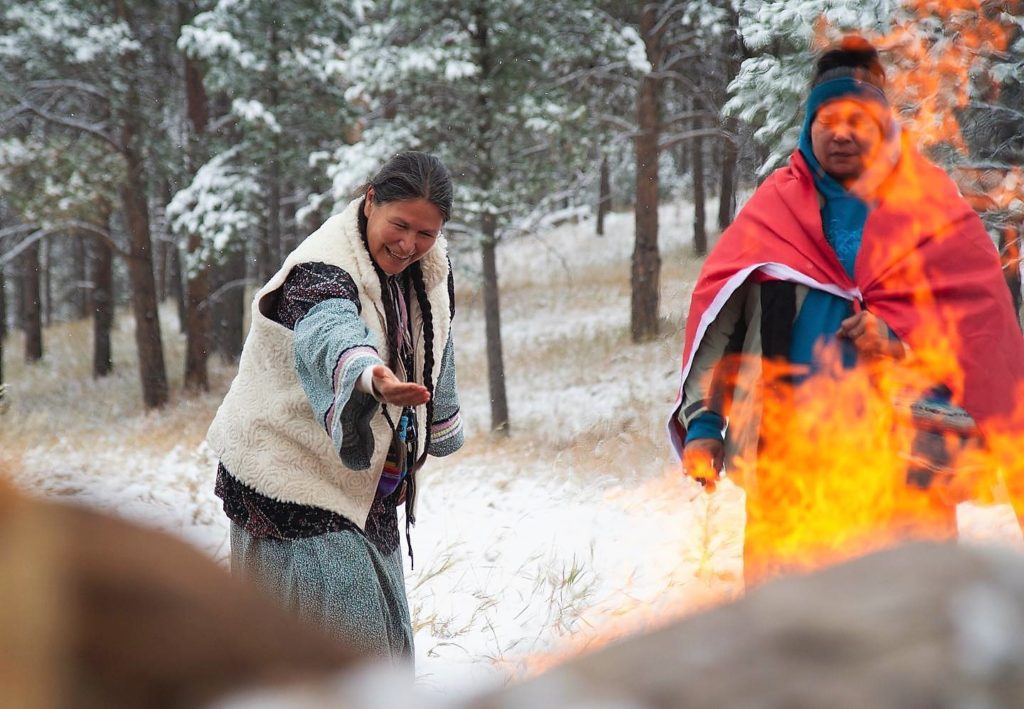
The U.S. Supreme Court in 1980 awarded $105 million to the tribes of the Great Sioux Nation for the theft of the Black Hills and other lands guaranteed under the 1868 treaty, which had promised the Oceti Sakowin, or Seven Council Fires, “the absolute and undisturbed use and occupation of the Great Sioux Reservation.”
“A more ripe and rank case of dishonest dealing may never be found in our history,” Supreme Court Justice Harry Blackmun said in his opinion of the U.S. failure to enforce the treaty language as required by the U.S. Constitution.
Three decades later, the interest on the money in the U.S. Treasury has brought the offer to upwards of $1.4 billion. However, insisting that “the Black Hills are not for sale,” the Sioux Nation tribes refuse to accept a payout and have lobbied for a settlement to return them the portion of the Black Hills that is under federal management.
“We want to bring our people back,” said Bettelyoun. This is a healing for a lot of us. It’s a combined effort of many different people. We got tired of just hearing people talk.
Camp Mni Luzahan is here and we’re going to keep it going,” he concluded.

Talli Nauman is Lakota Country Correspondent for The Esperanza Project. She is a longtime Americas Program collaborator and columnist, a founder and co-director of Journalism to Raise Environmental Awareness, and Health and Environment Editor for Native Sun News Today. She can be reached at talli.nauman(at)gmail.com.
This story was reported and produced with the generous support of the One Foundation.
- Clemency for Lakota icon Leonard Peltier called ‘moral indictment’ - January 21, 2025
- Lakota tribes, grassroots close ranks to defend Black Hills watersheds - January 21, 2024
- Native ‘hempsters’ follow global cooperative example - August 30, 2023
Cheryl Angel Chynna Lockett Fort Laramie Treaty Hermus Bettelyoun Homelessness Landback Lloyd BigCrow Sr. OyateKin Chante Wastepi-Feeding our Relatives Rapid City
?
????????⭐?